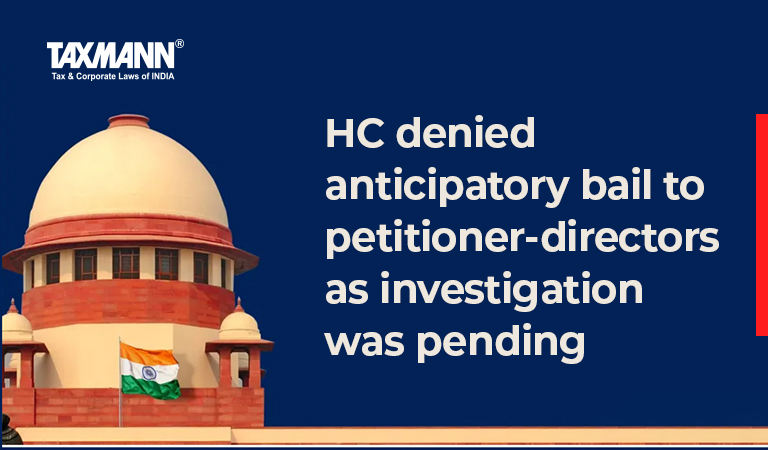HC denied anticipatory bail to petitioner-directors as investigation was pending
- Blog|News|FEMA & Banking|
- 2 Min Read
- By Taxmann
- |
- Last Updated on 25 February, 2022

Case Details: Vuppalapati Venkata Rama Rao v. Enforcement Directorate - [2022] 135 taxmann.com 133 (Telangana)[08-10-2021]
Judiciary and Counsel Details
-
- Dr. Shameem Akther, J.
Facts of the Case
The Petitioners-directors of company VMC were alleged to have indulged in money laundering offences. It was alleged that the petitioners resorted to various dubious transactions of the company, involving shell/dummy entities incorporated by them and by other fraudsters. The Directorate of Enforcement initiated a money-laundering investigation by registering subject crime. The Petitioners filed a petition under section 438 of Code of Criminal Procedure, 1973 seeking anticipatory bail on grounds that they were falsely implicated in the subject case. It was found that a huge amount of money had been laundered/siphoned and petitioners were indulged in money laundering offences by resorting to various dubious transactions in between companies, involving shell/dummy entities incorporated to perpetuate fraud and siphoned amounts.
High Court Held
Dismissing the bail plea, the High Court held that since the investigation was still in progress and if petitioners were granted anticipatory bail, the same would adversely affect investigation as petitioners may tamper with the evidence and there are also chances of fleeing away from the Country. Therefore, a grant of anticipatory bail, particularly in economic offences, would definitely hamper the effective investigation and, therefore, it was not a fit case to grant anticipatory bail to petitioners/accused under section 438 of Cr.P.C.
List of Cases Referred to
-
- Bhadresh Bipinbhai Sheth v. State of Gujarat [2016] 1 SCC 152 (para 3)
- Vakamulla Chandrasekhar v. Enforcement Directorate [WP (Crl.) No. 852 of 2017, dated 8-5-2017] (para 4).
Disclaimer: The content/information published on the website is only for general information of the user and shall not be construed as legal advice. While the Taxmann has exercised reasonable efforts to ensure the veracity of information/content published, Taxmann shall be under no liability in any manner whatsoever for incorrect information, if any.

Taxmann Publications has a dedicated in-house Research & Editorial Team. This team consists of a team of Chartered Accountants, Company Secretaries, and Lawyers. This team works under the guidance and supervision of editor-in-chief Mr Rakesh Bhargava.
The Research and Editorial Team is responsible for developing reliable and accurate content for the readers. The team follows the six-sigma approach to achieve the benchmark of zero error in its publications and research platforms. The team ensures that the following publication guidelines are thoroughly followed while developing the content:
- The statutory material is obtained only from the authorized and reliable sources
- All the latest developments in the judicial and legislative fields are covered
- Prepare the analytical write-ups on current, controversial, and important issues to help the readers to understand the concept and its implications
- Every content published by Taxmann is complete, accurate and lucid
- All evidence-based statements are supported with proper reference to Section, Circular No., Notification No. or citations
- The golden rules of grammar, style and consistency are thoroughly followed
- Font and size that’s easy to read and remain consistent across all imprint and digital publications are applied



 CA | CS | CMA
CA | CS | CMA
